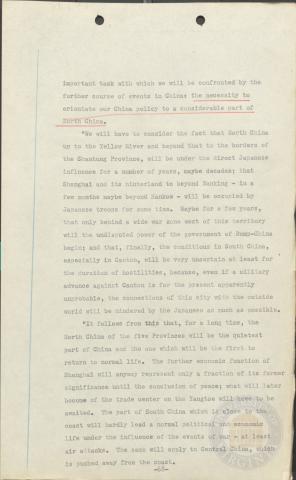
Page 68
| Parent | Collaboration Between Japan, Germany and Italy - Volume II |
|---|---|
| Date | 25 November 1941 |
| Language | English |
| Collection | Tavenner Papers & IMTFE Official Records |
| Box | Box 15 |
| Folder | Japan, Germany, Italy Collaboration Vol 2 |
| Repository | University of Virginia Law Library |
important task with which we will be confronted by the further course of events in Chinas the necessity to orientate our China policy to a considerable part of
"We will have to consider the fact that North China up to the Yellow River and beyond that to the borders of the Shantung Province, will be under the direct Japanese influence for a number of years, maybe decades; that Shanghai and its hinterland to beyond Nanking - in a few months maybe beyond Hankow - will be occupied by Japanese troops for some time. Maybe for a few years, that only behind a wide war zone west of this territory will the undisputed power of the government of Rump-China begin; and that, finally, the conditions in South China, especially in Canton, will be very uncertain at least for the duration of hostilities, because, even if a military advance against Canton is for the present apparently unprobable, the connections of this city with the outside world will be hindered by the Japanese as much as possible.
"It follows from this that, for a long time, the North China of the five Provinces will be the quietest part of China and the one which will be the first to return to normal life. The further economic function of Shanghai will anyway represent only a fraction of its former significance until the conclusion of peace; what will later become of the trade center on the Yangtse will have to be awaited. The part of South China which is close to the coast will hardly lead a normal political and economic life under the influence of the events of war - at least air attacks. The same will apply to Central China, which is pushed away from the coast.
